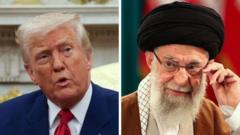The fourth round of negotiations regarding Iran's nuclear program has been rescheduled due to logistical issues, with both countries showing interest in avoiding conflict despite escalating tensions marked by recent US sanctions.
Fourth Round of Iran-US Nuclear Talks Delayed Amid Rising Tensions

Fourth Round of Iran-US Nuclear Talks Delayed Amid Rising Tensions
The anticipated talks between Iran and the US over Tehran's nuclear program have been postponed, raising questions about future negotiations amid new sanctions and threats.
---
A fourth round of talks focused on Iran's nuclear program between the United States and Iran has been postponed, as confirmed by Oman's foreign minister who facilitates the negotiations. Initially planned for Saturday in Rome, the discussions will be rescheduled once an agreed-upon date is established by both parties, citing logistical reasons for the delay.
This postponement follows recent warnings from US Secretary of Defense Pete Hegseth that Iran would face consequences for its support of Houthi rebels in Yemen. Additionally, the US has imposed new sanctions targeting entities linked to Tehran, intensifying scrutiny over its nuclear ambitions and regional influence.
Former President Donald Trump stepped away from an existing nuclear agreement with Iran and five other world powers in 2018, advocating for a more favorable deal. Throughout this negotiation process, he has cautioned that military action could follow if talks do not yield satisfactory results.
The initial round of discussions, which took place in Muscat, was described by both sides as "constructive." However, Iran's foreign ministry confirmed the postponement of this latest round, while the US has not officially commented on the situation. An unnamed source responded to the delay, stating that Washington had "never confirmed" its involvement in this latest round of negotiations.
Despite the setback, experts do not believe the talks have broken down completely, as both nations appear keen to avert a military conflict. Nonetheless, reports from Tehran indicate skepticism about the effectiveness of ongoing discussions, citing the introduction of new sanctions and contradictory signals from the US.
The recent sanctions implemented by the United States are part of Trump's "maximum pressure" strategy, targeting Iranian industries engaged in petroleum and petrochemical trade. US officials reiterated their stance, asserting that Iran's activities continue to exacerbate regional instability while using revenues to support terrorism.
Amid these myriad pressures, it's clear that the dialogue surrounding Iran's nuclear ambitions remains fraught with complexity. Iran insists its nuclear program is peaceful and advocates for a deal that would allow for enrichment in return for the alleviation of sanctions. Meanwhile, the administration in Washington maintains demands for a complete cessation of Iran's enrichment activities and support for regional proxies.
A fourth round of talks focused on Iran's nuclear program between the United States and Iran has been postponed, as confirmed by Oman's foreign minister who facilitates the negotiations. Initially planned for Saturday in Rome, the discussions will be rescheduled once an agreed-upon date is established by both parties, citing logistical reasons for the delay.
This postponement follows recent warnings from US Secretary of Defense Pete Hegseth that Iran would face consequences for its support of Houthi rebels in Yemen. Additionally, the US has imposed new sanctions targeting entities linked to Tehran, intensifying scrutiny over its nuclear ambitions and regional influence.
Former President Donald Trump stepped away from an existing nuclear agreement with Iran and five other world powers in 2018, advocating for a more favorable deal. Throughout this negotiation process, he has cautioned that military action could follow if talks do not yield satisfactory results.
The initial round of discussions, which took place in Muscat, was described by both sides as "constructive." However, Iran's foreign ministry confirmed the postponement of this latest round, while the US has not officially commented on the situation. An unnamed source responded to the delay, stating that Washington had "never confirmed" its involvement in this latest round of negotiations.
Despite the setback, experts do not believe the talks have broken down completely, as both nations appear keen to avert a military conflict. Nonetheless, reports from Tehran indicate skepticism about the effectiveness of ongoing discussions, citing the introduction of new sanctions and contradictory signals from the US.
The recent sanctions implemented by the United States are part of Trump's "maximum pressure" strategy, targeting Iranian industries engaged in petroleum and petrochemical trade. US officials reiterated their stance, asserting that Iran's activities continue to exacerbate regional instability while using revenues to support terrorism.
Amid these myriad pressures, it's clear that the dialogue surrounding Iran's nuclear ambitions remains fraught with complexity. Iran insists its nuclear program is peaceful and advocates for a deal that would allow for enrichment in return for the alleviation of sanctions. Meanwhile, the administration in Washington maintains demands for a complete cessation of Iran's enrichment activities and support for regional proxies.


















